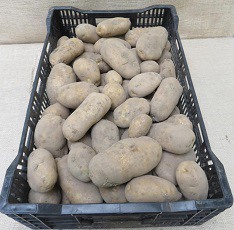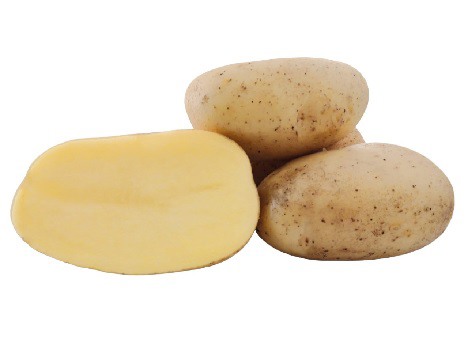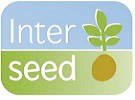Providing low-input potato varieties that guarantee good yields even under heat and drought stress due to increasing extreme weather events is one of the greatest challenges of current potato breeding. It is essential to take into account the many qualitative demands of processors and consumers.
Interseed Potatoes Ltd, an internationally active breeding company headquartered in Wittmund, Lower Saxony, is also working flat out to develop promising new potato varieties with a promising future for processing. In the run-up to the upcoming trade meeting at Weuthen Potato Day and Potato Europe, we spoke to Sales Manager Michael Stroß about the status quo and future direction of Interseed.
A new  Interseed project is the French fry variety TRAVIS, which was approved last year. "This medium-early potato variety could now be successfully grown and stored in the Rhineland. On the same farm, the variety is also growing and thriving particularly well this year," Stroß tells us. The breeder is confident that he has found a new and very interesting variety for processing purposes in Travis. Stroß says, "Not only the feedback from the industry, but also the yield results have been particularly promising so far."
Interseed project is the French fry variety TRAVIS, which was approved last year. "This medium-early potato variety could now be successfully grown and stored in the Rhineland. On the same farm, the variety is also growing and thriving particularly well this year," Stroß tells us. The breeder is confident that he has found a new and very interesting variety for processing purposes in Travis. Stroß says, "Not only the feedback from the industry, but also the yield results have been particularly promising so far."
Low-input potato varieties
Interseed Potatoes Ltd was formed in 2007 from the former Saatkartoffel-Handelsgesellschaft-Carolinensiel. A few years later, a branch was established in Dronten, in the heart of the Dutch potato stronghold of Flevoland. In addition, the company now has excellent locations for seed potato production in France and Scotland. A major advantage of seed potato production at several European locations is that it allows interesting new varieties to be tested under a wide range of conditions and climates, and also brings the company closer to regional markets.
The low-input strategy is always at the forefront, Stroß said. "Our three new French fry potato varieties ALANIS, CHENOA and MONTIS are ideally suited to a low-input strategy. In an internationally extensive variety trial in southern Spain, Montis and Chenoa already showed their great potential under heat stress several years ago. Chenoa is also ideally suited for long-term storage, as the baking color remains very constant throughout the entire storage period. Alanis stands out especially in saving chemical pesticides, as it has very high late blight and virus resistance.
"With all these exceptionally good varietal characteristics of Alanis, Chenoa and Montis, excellent processing quality is always guaranteed under a wide range of growing conditions."

The Travis variety
Security of supply top priority
Due to the Ukraine war and disrupted supply chains, food security is more in question than ever. High yield is still the most important criterion to ensure security of supply, says Stroß. Furthermore, varieties with reduced fertilizer requirements are visibly gaining relevance due to increasing price pressure on the fertilizer market during the Ukraine crisis. "Our French fry varieties mentioned earlier have proven their worth in this regard under a wide variety of climatic conditions in Central and Southern Europe, North Africa and Southeast Asia."
Nevertheless, Interseed Potatoes still sees some need for education on low-input potatoes. "We, as the potato industry, must ensure that low-input varieties are actually used in the industry. To be able to farm sustainably in the future, we need high-yielding potato varieties that combine a lot of disease resistance and good drought and heat tolerances. Without an assured good yield from new low-input varieties, no company will be able to survive economically. Therefore, we are confident we'll be well prepared for the future with our new potato varieties and our sustainable determined breeding work."
Visit the company at Potato Europe 2022: booth D26.
For more information:
Michael Stroß
Interseed Potatoes GmbH
Aldrup 3
D-27793 Wildeshausen
Tel: 0049/4434-8816
Fax: 0049/4434-8818
mstross@interseed.de
interseed.de
